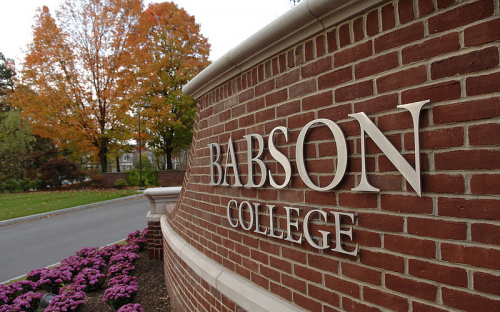Optimism about entrepreneurship is stronger than ever, as more than half the US population reported seeing good opportunities for starting businesses, according to Babson, the entrepreneurial specialist business school.
Fear of failure, which measures people’s willingness to take risks in launching a venture, decreased 2% to 30% from 2012.
“We are seeing a lot of positive signals,” Donna Kelley, Babson professor of entrepreneurship and lead author of the Global Entrepreneurship Monitor (GEM), told BusinessBecause.
Whereas during the economic downturn workers turned to entrepreneurship for a lack of jobs, “far more entrepreneurs are [now] driven by the prospect of opportunity”.
Babson is one of a growing number of elite US schools to offer start-up training to help students spot such opportunity. Michigan Ross School of Business recently received $60 million of funding to further develop its entrepreneurial offering. Ross in the last academic year supported the launch and growth of more than 100 start-ups, it said.
The rate of entrepreneurial take-up among MBA students has been rapid. At MIT Sloan, 36% of MBA students founded start-ups. For UC San Diego, 34% of MBAs launched a company.
Across the top-10 schools the average is 36%, with 87% of those companies still operating last year, according to data from the Financial Times, including ventures launched at USC Marshall and Oxford Saïd business schools.
Diane Morgan, associate dean at Imperial College Business School London, said the barriers to starting a business are low.
“There are more and more opportunities to enter incubator or accelerator programs and gain access to funding…Many of these are increasingly targeting students,” she said.
A number of schools have launched specialist start-up training programs, adapting to the changing career tastes of the next generation of business leaders.
Launched several years ago, the Ignite program of California’s Stanford GSB has been taught in Paris, Bangalore, New York, São Paulo, Santiago and Beijing. London Business School runs an Entrepreneurship Summer School, providing a route for entrepreneurs to launch ventures, and also runs a separate start-up incubator in the UK capital.
Simon Stockley, senior teaching faculty in entrepreneurship at Cambridge Judge Business School, believes entrepreneurship can be taught. He said: “People can be taught how to create or spot opportunities and how to build a business model to create, deliver and capture value from those opportunities.”
Babson’s Donna added that as well as offering a place to “fail safely”, business school provides a global network that entrepreneurs can tap into.
“College is a great place to develop your skills and test your ambitions,” she said. “It’s a great place to bounce ideas off of other entrepreneurially minded students.”
Nearly 10% of US entrepreneurs are starting medium or high-technology businesses, according to the GEM study. This trend is mirrored globally as the internet has reduced the cost of starting a company, fuelling the rise of entrepreneurialism.
“Technology is playing an increasingly import role in the start-up ecosystem,” said Aruna Reddy, head of the Cell for Entrepreneurship at the Indian School of Business. “The fast paced development of web technologies, rapid prototyping, and 3D printing have definitely made it easier for entrepreneurs to validate, refine, and start-up.”
According to the GEM report, 6.5% of US entrepreneurs are starting businesses within organizations — an indication that “corporate entrepreneurship” can coexist alongside independent start-ups.
“More and more students are interested in the way their organization may develop an entrepreneurial mind-set,” said Justin Jansen, professor of corporate entrepreneurship at Rotterdam School of Management.
“Incumbent firms face a highly dynamic and disruptive environment,” he added. “They need to respond faster, but also in different ways — by changing their business model and changing the way they collaborate with and acquire novel insights from start-ups and clients.”
Women entrepreneurs in the US demonstrate some of the highest rates of start-up activity —11% — in the developed world, according to GEM. Business schools have sought to develop more female up-starts with initiatives such as funding for scholarships and seed capital.
New York’s Columbia University, for example, this year ran a program with the Kenya Association of Women Business Owners to offer training for emerging market women hoping to scale start-up companies.
Dr Muhammad Azam Roomi, senior lecturer in entrepreneurship at Cranfield School of Management, said women’s business school networks can act as a source of referrals and marketing for company founders.
“These networks help them in finding customers and act as an excellent word of mouth promotional strategy, saving advertisement costs,” he said.
RECAPTHA :
ce
fc
05
49








